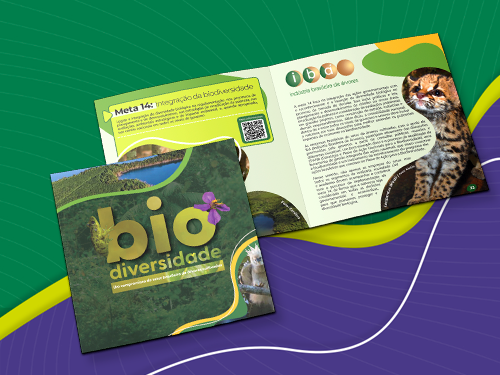Ibá launches report at COP16 presenting the planted tree industry's biodiversity commitments

This Monday (21), which marks the start of the Conference of the Parties to the UN Convention on Biological Diversity (COP16), Ibá released a report entitled “Biodiversity: a commitment by the Brazilian planted tree industry.' This 55-page document describes effective activities already being implemented by Ibá member companies which are aligned with the 23 targets of the Kunming-Montreal Global Framework.
The framework, which was signed by 196 nations at the last edition of the event, is a robust plan that established targets to be attained by 2030 for the conservation and sustainable use of biodiversity, as well as fair and equitable access to and sharing of the benefits resulting from the use of genetic resources and associated traditional knowledge.
For decades, the planted tree sector has worked to care for the biodiversity present in its lands dedicated to cultivation and preservation. Over 8,310 species have been recorded in these areas, including flora, mammals, birds, fish, reptiles, amphibians, invertebrates and fungi. These species are distributed across five Brazilian biomes: the Amazon Forest, Caatinga, Cerrado, Atlantic Forest, and Pampa. Of these, 335 are considered threatened. In the Cerrado and Atlantic Forest biomes, 26 species (including birds, mammals, and flora) have been classified as bioindicators, organisms that are very sensitive to changes in the environment and consequently considered indicators of environmental quality. In these same two biomes, 7 species of flora and 14 species of fauna were classified as rare. The new publication specifically highlights the sector's efforts to care for this biodiversity and ensure the future of our planet.
For example, the report describes how Veracel has carried out conservation activities at the Estação Veracel Private Natural Heritage Reserve in southern Bahia for 25 years. This reserve has over 6,000 hectares of Atlantic Forest and ranks among the top 20 conservation areas globally in terms of number of tree species, and has also recorded 300 bird and mammal species including the harpy eagle, one of the largest birds of prey in the world which is also considered at risk of extinction. Conservation at Estação Veracel is in line with Target 3, which addresses protected areas and other effective conservation measures.
Another noteworthy example is Project Indaiá, located in Minas Gerais, which has been supported by Cenibra since 2005 and contributes to generation of jobs and income for the local community. The company grants artisans access to its forest management areas to collect indaia palm leaves, and also offers training and sponsorship for them to participate in regional and national fairs and exhibitions. This initiative fosters the sale and promotion of crafts that have been produced for three centuries in the town of Antônio Dias, and is associated with Target 5, which addresses the sustainable harvesting and trade of wild species.
Ibá itself is a presence and active participant in discussions promoted by the government, together with Brazilian companies in the planted tree industry, through public consultations, meetings and various initiatives. This is in line with Target 14, which works to incorporate government activities with recognizing and integrating biodiversity into decision making processes. One good example is the process to update the National Biodiversity Strategy and Action Plan (EPANB), a tool for integrated management of national activities that is intended to preserve biodiversity and also serves as a tool to monitor progress on Brazil's activities contained in the Biodiversity Action Plan.
These are only a few of the initiatives contained in the publication, which also presents efforts towards biodiversity by Veracel, CMPC, TTG Brasil, Bracell, Melhoramentos, Suzano, Klabin, Eldorado Brasil, Eucatex, Norflor, Irani, TRC, Sylvamo and Gerdau. Note that each company's efforts are not limited to the actions and projects detailed here; the publication also cites other targets that each company directly contributes to.
“The greatest challenges of humankind's journey now involve the climate crisis and biodiversity. This industry is innovating with this new publication on biodiversity that describes concrete cases that transform targets into action. This is what the world needs,” explains Ibá President Paulo Hartung.
“This document is a milestone along the trajectory of the planted tree sector, showing that activities to preserve biodiversity are profoundly incorporated into the corporate mission. The future is at risk, the time to take action is now,' states Ibá's Manager for Forest Policy and the Bioeconomy, Patrícia Machado.
The document will be presented during COP16 at a side event organized by Ibá in partnership with PEFC International and the World Business Council for Sustainable Development (WBCSD). The panel will provide more information on innovative projects that contribute to the biodiversity agenda and focus on sustainable forest management. The planted tree industry is a notably strong presence at this meeting of the parties, with representatives from 13 companies.
The new publication “Biodiversity: a commitment by the planted tree industry” can be accessed here.
About Ibá
The Brazilian Tree Industry (Ibá) is the association responsible for institutionally representing the planted tree production chain, from the fields to the factory, with its main stakeholders. Established in April 2014, Ibá represents 48 companies and 10 state entities for products originating from planted trees (wood panels, laminate floors, pulp, paper, energy forests and biomass), in addition to independent producers of planted trees and institutional investors.
Site: https://iba.org/ Instagram: https://www.instagram.com/iba_oficial/ Facebook: https://web.facebook.com/industriabrasileiradearvores
Ibá press contact
Beatriz Montesanti
+55 11 97142-2935

